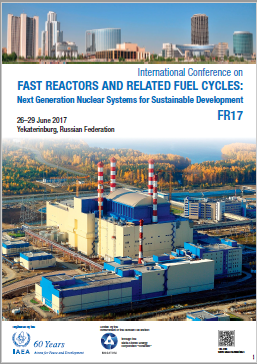Speaker
Dr
William Carmack
(Idaho National Laboratory)
Description
Research and development activities on fast reactor fuels in the US are focused on their potential use for actinide transmutation in future sodium fast reactors. As part of this application, there is a desire to demonstrate a multifold increase in burnup potential.
A number of fuel design innovations are under investigation with a view toward significantly increasing the burnup potential of fuels, since higher discharge burnups equate to lower potential actinide losses during recycle. Promising innovations under investigation include: 1) lowering the fuel smeared density in order to accommodate the additional swelling expected as burnups increase, 2) utilizing an annular fuel geometry for better geometrical stability at low smeared densities, as well as the potential to eliminate the need for a sodium bond, and 3) minor alloy additions to immobilize lanthanide fission products inside the metallic fuel matrix and prevent their transport to the cladding resulting in fuel-cladding chemical interaction.
This paper presents results from these efforts to advance fuel and cladding technology in support of high burnup and actinide transmutation objectives. Highlights include examples of fabrication of low smeared density annular metallic fuels, experiments to identify alloy additions effective in immobilizing lanthanide fission products, and early postirradiation examinations of annular metallic fuels having low smeared densities and palladium additions for fission product immobilization. Advanced cladding development activities include the investigation of high dose tolerant steel alloys. An overview of the U.S. Department of Energy fast reactor fuel research and development activities will be provided.
Country/Int. Organization
Idaho National Laboratory - USDOE
Author
Dr
William Carmack
(Idaho National Laboratory)
Co-authors
Dr
Jason Harp
(INL-DOE)
Mr
Randall Fielding
(INL-DOE)
Dr
Steven Hayes
(Idaho National Laboratory - USDOE)
Dr
Stuart Maloy
(LANL-DOE)
Dr
Tarik Saleh
(LANL-DOE)

